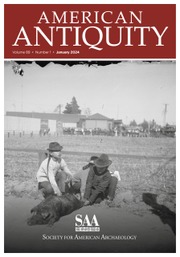Article contents
Aboriginalism and the Problems of Indigenous Archaeology
Published online by Cambridge University Press: 20 January 2017
Abstract
This paper contends that proponents of various forms of Indigenous Archaeology base their argument on a paradigm of Aboriginal essentialism ("Aboriginalism") that is derived from the long-discarded concept of Primitive Man. The development of Aboriginalism is explored as a mutually reinforcing process between Indigenous and Western scholars, based on evidence that is at best anecdotal. The adoption of this flawed concept by archaeologists, Western publics, and Indigenous people themselves has led to problematic assumptions that have negative consequences for both the practice of archaeology and for the lives of those who identify themselves as Indigenous. Archaeologists can usefully challenge the historical assumptions on which the paradigm of Aboriginalism is based: the belief that local societies have endured as stable entities over great periods of time, and the consequent projection of contemporary ethnic identities into the deep past. Such a challenge confronts a significant element of the intellectual climate that allows marginalized groups to exist as permanent aliens in the societies of settler nations.
Résumé
Este trabajo sostiene que los proponentes de diferentes formas de "arqueología indígena" basan sus argumentos en un paradigma de esencialismo aborigen ("aboriginalismo") que se desprende del concepto, desterrado hace tiempo, del hombre primitivo. El desarrollo del aboriginalismo se examina desde la perspectiva de un proceso mutuamente complementario entre los especialistas indígenas y occidentales, basado en la evidencia que es, a lo sumo, anecdótica. La aceptación de este concepto viciado por parte de los arqueólogos, el público y la propia población indígena, ha llevado al establecimiento de hipótesis problemáticas que influyen de forma negativa tanto en la práctica de la arqueología como en la vida de los que se identifiquen como indígenas. Los arqueólogos pueden cuestionar con eficacia las hipótesis históricas en las que se fundamenta el paradigma del aboriginalismo: la presunción de que las sociedades locales han sido históricamente estables y perdurables durante largos períodos de tiempo, y la proyección de las identidades étnicas actuales en el pasado. Para ello, abordaremos un elemento importante del clima intelectual que permite a las sociedades marginadas seguir existiendo como extranjeros permanentes en las sociedades de las naciones coloniales.
- Type
- Articles
- Information
- Copyright
- Copyright © Society for American Archaeology 2008
References
References Cited
- 77
- Cited by




